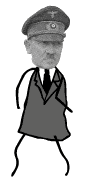For a bunch of amoral foul-ups, the Nazis at Nuremberg were an above average group. Four of them, Schacht, Seyss-Inquart, Göring and Dönitz were in the genius range. In fact, Schacht and Seyss-Inquart possessed IQ's equaled by a mere 1 percent of humanity. Unfortunately, Hitler himself was never tested (though some have attempted to estimate his IQ), leading to much speculation about his relative intelligence.
During the course of the defendants' testimony during the trial of the major war criminals, many of them offered their reflections on Hitler; truly informed opinions which provide a number of clues to the Führer's intellectual capacity. (Note: One must, of course, bear in mind that the defendants continually emphasized Hitlers unassailable authority as an element in their defense, saying in effect that the Führer was the whole show and they had little or no influence, thereby mitigating their own guilt.) The following are some pertinent excerpts from this fascinating material:
Funk - IQ 124: "I immediately received the impression of an exceptional personality...He grasped all problems with lightning speed and knew how to present them very impressively, with great fluency and highly expressive gestures."
Jodl - IQ 127: "Hitler was a leader to an exceptional degree. His knowledge and his intellect, his rhetoric and his will power triumphed in the end in every spiritual conflict over everyone. He combined to an unusual extent logic and clarity of thought, skepticism and excess of imagination, which very frequently foresaw what would happen but also very often went astray. I really marveled at him when, in the winter of 1941-2, by his faith and his energy he established the wavering Eastern Front...The modesty in his mode of life was impressive... ...I became convinced - at least during the years 1933 to 1938 - that he was not a charlatan but a man of gigantic personality who, however, in the end assumed infernal power. But at that time he definitely was an outstanding personality...My influence on the Führer was unfortunately not in the least as great as it might, or perhaps even ought to have been in view of the position I held. The reason lay in the powerful personality of the despot who never suffered advisors gladly."
Ribbentrop - IQ 129: "His thoughts and statements always had something final and definite about them, and they appeared to come from his innermost self. I had the impression that I was facing a man who knew what he wanted and who had an unshakable will and who was a very strong personality."
Keital - IQ 129: "To a degree which is almost incomprehensible...Hitler had studied general staff publications, military literature, essays on tactics, operations and strategy and...he had a knowledge in the military fields which can only be called amazing...Hitler was so well informed concerning, armament, leadership and equipment of all armies and...all navies of the globe that it was impossible to prove any error on his part...Hitler studied at night all the big general staff books by Moltke, Schieffen and Clausewitz...Therefore we had the impression: Only a genius can do that...even in the simple everyday questions concerning organization and equipment of the Wehrmacht ... I was the pupil and not the master... ...Concerning...decisions he did not brook any influence."
Dönitz - IQ 138: "A powerful personality...with extraordinary intelligence and energy, with a truly universal education, a nature radiating force and an enormous power of suggestion. I deliberately went to his headquarters only rarely because after a few days stay at his headquarters I felt that I must remove myself from his power of suggestion...In principle there was no question of a general consultation with the Führer."
Göring - IQ 138: "After a certain time, when I had acquired more insight into the Führer's personality, I gave him my hand and said: 'I unite my fate with yours for better or for worse...in good times and in bad, even unto death.' ...With the dynamic personality of the Führer, unsolicited advice was not in order and one had to be on very good terms with him. That is to say one had to have great influence, as I had...as I had beyond for many years...Suggestions and advice were curtly brushed aside whenever he had once made his decisions or if...the would-be advisor had not that influence or that influential position...Foreign policy above all was the Führer's very own realm...Foreign policy on the one hand and the leadership of the Armed Forces on the other hand enlisted the Führer's greatest interest and were his main activity...He busied himself exceptionally with these details...In certain cases he would ask for data to be submitted to him without the experts knowing the exact reason. In other cases he would explain to his advisors what he intended to do and get from them the data or their opinion. Final decisions he took himself...In my opinion the Fuehrer did not know about details in the concentration camps, about atrocities...As far as I know him I do not believe he was informed."
Schacht - IQ 143: "He read an enormous amount and acquired a wide knowledge. He juggled with that knowledge in a masterly manner in all debates, discussions and speeches. He was undoubtedly a man of genius in certain respects. He had sudden ideas of which nobody else had thought and which were at times useful in solving great difficulties, sometimes with astounding simplicity, sometimes, however, with equally astounding brutality. He was a mass psychologist of really diabolical genius...I believe that originally he was not filled only with evil desires; originally, no doubt, he believed he was aiming at good, but gradually he himself fell victim to the same spell which he exercised over the masses...He was a man of unbending energy and of a will-power which overcame all obstacles...Only those two characteristics - mass psychology and his energy and will-power - explain that Hitler was able to rally up to 40 per cent, and later almost 50 per cent, of the German people behind him."
Some maintain that Hitler was not an 'original thinker,' thus denying that his IQ was much more than 140 or so. I am of the opinion that Hitler WAS an original thinker. This is based on the obvious innovations Hitler created in the fields of armored warfare and propaganda, as well as his compelling-to-Germans-of his-time synthesis of the major ideas of his day (Social Darwinism, nationalism, socialism, capitalism, etc.) into a workable ideology. My best guess was that Hitler's IQ was around 150.
Keep in mind, however, that high IQ hardly equals infallibility. Even Albert Einstein, regarded as the brightest of the bright, made some class-A boners. Hitler may have (arguably) been a genius regarding IQ, but the ultimate result of his policies hid the fact well.
Personality trumps IQ. One can list many brilliant minds that were burdened by personality deficits (Bobby Fisher, etc.) which ultimately denied them from reaching their full potential. Character flaws such as overconfidence, pride, greed, gambling, and vindictiveness certainly visited the German Fuehrer. Every one of Hitler's many blunders have their roots in one or more of these traits that have little to do with IQ.
Of them all, it was probably hubris that did more to bring down Hitler than anything else. Succumbing to the greatest intrinsic weakness of the self-made man, Hitler began to worship his creator while falling for his own propaganda. He was only human. When millions proclaim one a savior provided by Providence, when one has just produced a string of stunning successes forecast by no one, human nature does the rest.
Forrest Gump, admittedly a fictional character, had no IQ to speak of, but he had very few character flaws.
If Stupid is as Stupid does, Genius is as Genius does. Hitler, who brought his nation to ruin and destruction while murdering millions, was certainly no genius.
Sources: The IMT Transcripts, and
Nuremberg: A Nation on Trial by Werner Maser, translated by Richard Barry.
Copyright © 2008-2015 Walther Johann von Löpp All rights reserved.

 Twitter: @3rdReichStudies
FB: Horrific 20th Century History
Twitter: @3rdReichStudies
FB: Horrific 20th Century History







Twitter: @3rdReichStudies FB: Horrific 20th Century History






